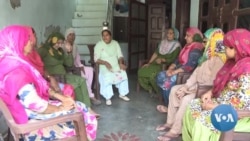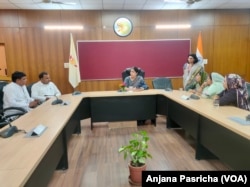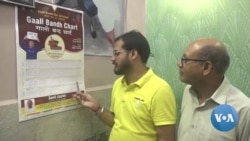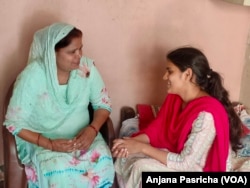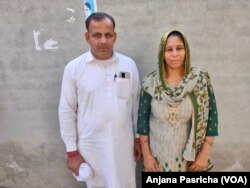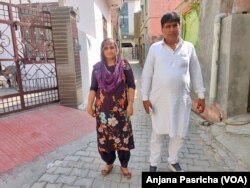Since she was married 20 years ago, Sangeeta Malik only steps out of her home in Khanpur Kalan village with her head covered – a longstanding tradition in India’s Haryana state. That custom did not change after she was elected head of the village council last November.
Thousands of village councils, the lowest rung of governance in India, are led by women because of a law mandating that at least one third of village council seats should be reserved for women – Haryana state in north India has raised that number to 50%. The aim is to empower them at the grassroot level and promote their involvement in local politics in a country which has only a handful of women leaders.
On the ground, however, there has been little change. In many regions, like Malik’s village, that are patriarchal and conservative, the real power is still wielded by men.
Women like Malik, long confined to housekeeping roles, never questioned the custom, even as they moved to occupy the top post in the village. “Men take all the decisions here. Women have always stayed in the backdrop,” she said in a matter-of-fact tone as she shrugged.
Realizing that this attitude was defeating the aim of the law, the head of a university just a few kilometers from the village has launched a program to encourage the women to emerge from behind the shadows of men and lead from the front.
SEE ALSO: A related video by Anjana Pasricha
Sudesh Chhikara, Vice Chancellor of Bhagat Phool Singh Mahila Vishwavidyalaya, in Khanpur Kalan, decided to reach out to the women council heads after attending a village function last year where she found that the female council head was inconspicuous behind a veil while her husband stood on the stage conducting the council’s program.
Following elections in November that brought scores of women to lead local councils, the university began organizing workshops for neighboring villages. It was not easy to initiate change among women who had seldom ventured out of their homes and spent their time on household chores and tending to animals.
Visiting the university’s vast campus and sitting in its impressive conference room was initially overwhelming for the village heads. Most came accompanied by their husbands.
“They had a very low self-belief about themselves and their roles. They believed that their role is not to lead, the men will lead the village and the family as well. It was basically because of the social construct,” pointed out Chhikara.
That is slowly changing. In recent months, the women have learned that they should bring women’s perspective to development of their villages and that funds allocated to local councils should be used for issues such as girls’ education, nutrition and health. They were told about the importance of tackling issues such as drug addiction and unemployment among young people in the village.
“We wanted to tell them that this is a very responsible role they have, and they can do it very effectively. When they can manage their home, they can manage their village also,” says Chhikara.
The message is having an impact. After visiting the university and interacting with teachers, Malik has gained the confidence to play a more proactive role in the council. She now encourages women in the village to articulate their problems and wants to use the remaining four years of her term to improve the village.
“I want to ensure that the village gets better quality water and that the streets are cleaned,” says Malik. "The entire village should shine."
Winds of change are also sweeping through nearby villages. For Parmila Kumari, of Kailana Khas village, making women economically independent so that they can stand on their own feet is a top priority.
“I want to open a stitching center and a beauty parlor, which could create employment opportunities for women,” says Kumari stressing the importance for women to have an income.
Sheila Devi, the head of Gamri village, who has a young granddaughter, wants to focus on education of girls and nutrition by ensuring that school children get the full benefit of government-run midday meal programs in schools.
With many women complaining of abuse from husbands who come home drunk, she also asks if it is possible to shut down local shops selling liquor.
Those from the university who have been counseling the women in recent months have witnessed a gradual transformation -- they have become more articulate. “We have seen there is a change in their attitudes, change in their skills and change in the knowledge,” says Manju Panwar, head of the department of Social Welfare at Bhagat Phool Singh Mahila Vishwavidyalaya.
But breaking age-old traditions is not easy – men still hold considerable sway. And in the deeply rooted power structure of the village, women categorically assert that they cannot take independent charge.
“We have to get the consent of the men for whatever we do,” points out Kumari. “Only if they agree, we can pursue our ideas.” It’s a line that is echoed by the others.
“Women must get the support of men. Only then women can move ahead,” says Malik.
Chhikara is aware that they must tread slowly in society that is deeply conservative. “We tell them that you don’t have to enter into a conflicting situation with your husbands or families, but you have power to influence them and tell them about issues that matter.”
The long-term hope is that the gradual change in the women’s mindset will trickle down to their daughters and granddaughters and make the next generations more assertive.




